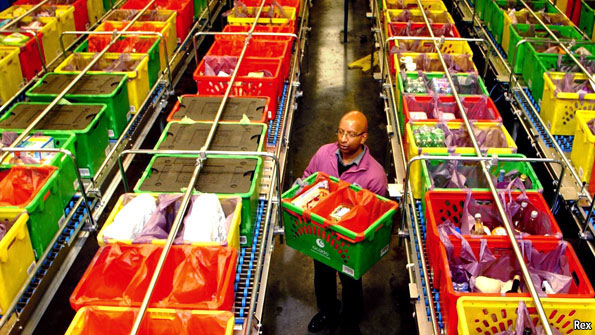 Anyone who dreads the prospect of spending an hour in the local grocery store is a natural potential customer for online grocers who promise to bring the goods to your home at a predetermined time. This is particularly true for customers in urban locations where the selection in grocery stores often leaves much to be desired and carrying bags home without a car can be unappealing. With what appears to be a natural customer base, why have nearly all online grocers failed to come up with a profitable business model?
Anyone who dreads the prospect of spending an hour in the local grocery store is a natural potential customer for online grocers who promise to bring the goods to your home at a predetermined time. This is particularly true for customers in urban locations where the selection in grocery stores often leaves much to be desired and carrying bags home without a car can be unappealing. With what appears to be a natural customer base, why have nearly all online grocers failed to come up with a profitable business model?
The Economist published an article this week regarding the booming market for online groceries in Britain. While delivery services are very popular, particularly among those who lack a car in the more dense urban areas, a profitable business model has proven elusive for market participants:
A company selling music online needs only to add a few servers to increase capacity if sales double. Amazon, the world’s biggest online retailer which relies on the postal service for many of its deliveries, can simply ship items a day or two later if it is overwhelmed. Grocers, on the other hand, sell perishable products that have to be kept frozen or cool and that must also be delivered at specific times. To make matters worse, online grocery shoppers tend to want their food delivered at the beginning or end of the week, leading to a crush of orders.
All this is expensive. Some analysts reckon it costs £20-25 to deliver groceries to a British house. In large parts of America, where population densities are lower, it would be much costlier.
To add further problems to the business model, customers are reluctant to pay more than a nominal amount for delivery even though having groceries delivered directly to the home can save the expense associated with driving to the local store. For suburban customers who are driving every day for other purposes, the marginal cost of going to the grocery store is not that high in terms of the direct cost of fuel plus wear and tear on the vehicle.
The real value proposition for online grocery shopping is convenience and time savings. If a busy family can save one hour per week by having groceries delivered, this should be worth enough to offset the charge for delivery given the opportunity cost of the time. However, few customers think in terms of opportunity cost in this manner and almost everyone has been trained to expect free or very low cost delivery. Amazon and Zappos, recently acquired by Amazon, are excellent examples of vendors offering free delivery to a majority of customers. For those interested in Zappos, please refer to our book review on Tony Hsieh’s book Delivering Happiness: A Path to Profits, Passion, and Purpose.
